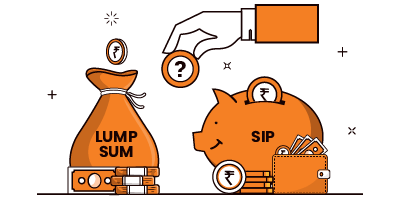In our life, we always want different options. If we want to go for outstation then different options may be local or global and so on. Same way when we go for investing it also comes with different options as well choices. As an investor, you have different asset allocations like Debt, Equity, Mutual fund, currency, commodity, etc.
We are discussing investment in the mutual fund segment and how can you invest. The options of investment if different assets like debt mutual fund, equity mutual fund, or others are available options to investors which category or scheme investor want to invest. Along with the option, one can also choose how to invest in mutual funds. So, let's discuss what is systematic investment plan and lumpsum investment are and the key differences in both.
Broadly these are two options
- What is a SIP investment:- SIP stands for a systematic investment plan. An investor can choose to spread it out over a period of time through a different period of time. It is called a Systematic Investment Plan (SIP).
What is a lumpsum investment: An investor can make a one-time investment.
The mode of investment can make a difference in an investor’s investment portfolio. We are talking more details of both investment routes as below:
Understanding Lumpsum Vs. SIP:-
Both the route SIP as well as lumpsum investments allow investors to benefit from potential wealth creation through the mutual fund segment.
The primary difference between both routes is the frequency of investment. Lumpsum investments are one-time investments in particular instruments or mutual fund schemes. On the other hand.
Where SIP allows investors to invest money into an instrument or mutual fund schemes periodically such as daily, weekly, fortnightly, monthly, quarterly, annually, etc.
The minimum investment amount also varies. Normally the mutual fund allows lumpsum investment with at least Rs. 5000 while the SIP investment with as little as Rs. 1000 per month. Some schemes even allow Rs. 100 per month too.
Amount Availability: If you have a small but regular amount for investment then SIP can work as a better option. While for investors with a relatively high investment amount lumpsum investments may work better.
Benefits of SIP Vs. Lumpsum comparison
SIP offers the benefits over lumpsum investment hence most investors prefer to invest period through the SIP method. Some of these are the outline as below:
Monitor market
Investors need to know when they are entering the market. Lumpsum is most beneficial when you invest during a market low as it is a bulk investment. However, with SIP you are entering different periods so it will provide the chance to enter during different market cycles. Investors do not have to watch market movements as closely as they would for lump-sum investments.
Rupee – cost Averaging Benefits
As SIP leads to mutual fund purchases during different market cycles, the cost per unit is averaged out overall investment horizon. More number units are purchased during a market low, compensating for purchases made during a market high. This can help tide over market fluctuations and even out the cost. Units can then be sold when the market is performing well.
Investment Amount Requirement
As mentioned above, you can begin investing in SIPs with as little as Rs. 1,000 per month. On the other hand, lump-sum investments need at least Rs.5, 000. Through the SIP Calculator, investors can estimate the return and goal-based investment.
Power of Compounding
The power of compounding is called the eighth wonder of the World and it paid well to the SIP investor. The interest or earnings from the SIP investments are reinvested in the same fund or instruments. Hence the compounding effect helps generate greater returns to investors.
Make discipline investment
Banks allow you to set up an automatic investment instruction at a frequency of your choice hence you are able to start saving. SIP helps you into the habit of saving frequently.
Benefits of Lumpsum -During Times of Market Lows
For investors who can recognize market cycles, identifying a market low and investing a lump sum amount in a mutual fund at the right time can generate high returns. This is because of the basic principle of investing – buying low and selling high.
However, an ill-timed investment could result in losses and lost confidence. This is because an investor whose lumpsum is making losses may hesitate to pump in money again. Seasoned investors with ample market knowledge can benefit from lumpsum investments.
It can give considerable returns for those with a long-term investment horizon (5 years minimum).
It can help achieve specific financial goals like investing for a child’s education fund or for a child marriage and retirement fund, etc.
It requires a one-time payment only.
Points to be Considered Before Investing
We had talked about the benefits of both Lumpsum as well as SIP. But prior to investing you have to consider the following points too:
Investable Surplus or Amount
If you have a bulk amount at your disposal, a lumpsum investment may be a good way to go so that you do not end up spending the money. On the other hand, for a salaried person trying to inculcate a savings habit, SIP would be more suited.
Market Timing
During a market low, the lumpsum investment will generate higher returns. If you are unable to identify cycles, a SIP will help distribute the risk.
Fund Type
For equity funds, as mentioned above, market volatility plays a huge factor in returns. Debt funds are less affected by market trends and are likely to give you similar returns for a lump sum investment and SIP investments.
Conclusion
Choosing a SIP over a lump-sum investment should be based on your personal requirements. Factors such as income, financial stability, investment goals, and risk capacity must determine the route of investment.
That said, GEPL Capital believes that SIPs are superior on two counts: they can help you tide over market fluctuations and be a good investment option even for novice investors since they do not necessitate frequent monitoring of financial markets.
Either way, it is better to invest rather than just waiting and waiting and don’t invest. So, take the first step towards your mutual funds investment journey with GEPL Capital by clicking here.





_60c60284574c0.jpg)

